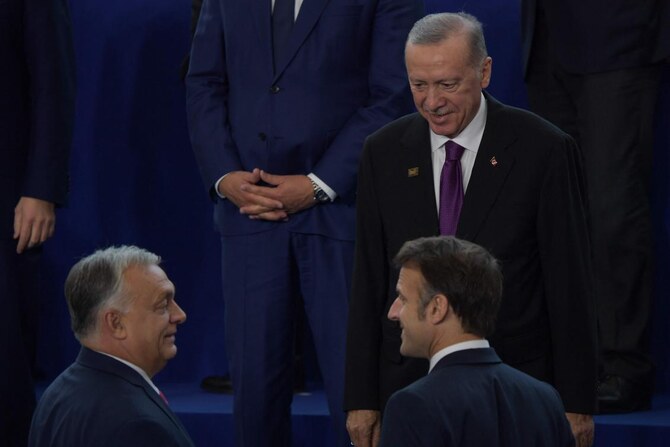ANKARA: Turkiye’s President Recep Tayyip Erdogan said on Friday that he hoped US President-elect Donald Trump would tell Israel to “stop” its war efforts, suggesting a good start would be halting US arms support to Israel.
“Trump has made promises to end conflicts ... We want that promise to be fulfilled and for Israel to be told to ‘stop,’” Erdogan told reporters on a return flight from Budapest, according to an official readout.
“Mr. Trump cutting off the arms support provided to Israel could be a good start in order to stop the Israeli aggression in Palestinian and Lebanese lands,” he was cited as saying.
Trump’s election victory this week was generally met with cheer in NATO-member Turkiye, with markets rallying and some officials cautiously optimistic about prospects for new US economic policies.
‘US President-elect Donald Trump had very nice things to say about Turkiye regarding the period ahead. We invited him to our country.’
Recep Tayyip Erdogan
Erdogan sought to reset Turkiye’s strained ties with the US by inviting the president-elect to visit and said Trump spoke very positively about Turkiye during a phone call.
Erdogan said that he hoped Trump would accept the invitation.
He said he hoped a visit would strengthen cooperation between Turkiye and the US and lead to a relationship “different from (Trump’s) previous term” when clashes on a number of issues led to Washington imposing punitive tariffs that hurt Turkiye’s economy.
“We had a sincere call with Mr. Trump while he was at a family dinner (that included) Elon Musk and Musk’s child,” Erdogan said of the Wednesday call, according to an official Turkish readout.
“He had very nice things to say about Turkiye regarding the period ahead. We invited him to our country. I hope he accepts ...”
Erdogan added that Ankara’s cooperation with Trump’s White House could also help solve regional crises.
Outgoing US President Joe Biden did not visit Turkiye during his term, and Erdogan’s planned White House visit early this year fell through with little explanation.
While Erdogan and Trump had closer personal bonds in Trump’s 2017-21 term as president, it was also a period of strained bilateral ties due to disputes over Washington’s ties with Kurdish fighters in Syria and over Ankara’s ties with Moscow.
An official in Erdogan’s AK Party said that Ankara expects the Trump administration to be more flexible and understanding of its security needs, especially against the outlawed Kurdistan Worker’s Party or PKK in Syria and Iraq.
After Trump’s election win, Turkiye’s lira reached its most substantial level in weeks, while Istanbul’s stock has risen more than 5 percent.
On Thursday, Trade Minister Omer Bolat said he expected Trump to lower tariffs on Turkiye’s steel and textile exports, even though Trump promised to levy 10 percent tariffs on all imported goods.
Sinan Ulgen, a former Turkish diplomat and director of the Center for Economic and Foreign Policy Studies or EDAM said Ankara would probably be happy with a Trump victory in the short term, making it easier to open dialogue after the stand-offish Biden years.
However, he added that broader differences in foreign policy on issues such as the Israeli-Palestinian conflict and Syria could still become thorny in the long term.
“Ankara will try to create an agenda to reset Turkish-American ties. This can easily turn into a more transactional relationship that Trump can get on board with,” he said.
“What the United States’ expectation will be of Turkiye in such a relationship, that needs to be cleared up.”
























